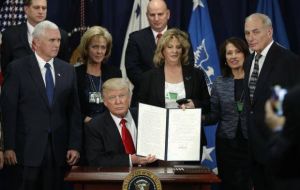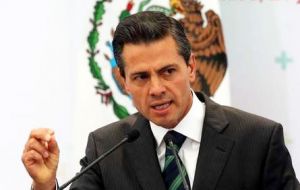MercoPress. South Atlantic News Agency
Mexicans furious with Trump; president Peña Nieto considering dropping White House visit
 The new US president signed an executive order to beef up the nation’s deportation force and start construction on a new wall between the countries.
The new US president signed an executive order to beef up the nation’s deportation force and start construction on a new wall between the countries.  “I regret and condemn the United States’ decision to continue with the construction of a wall that, for years now, far from uniting us, divides us” said Peña Nieto.
“I regret and condemn the United States’ decision to continue with the construction of a wall that, for years now, far from uniting us, divides us” said Peña Nieto. When Donald J Trump called some Mexican immigrants rapists, threatened to deport millions of them and promised to build a wall to keep others out, Mexican officials counseled caution, saying it was merely bluster from an unlikely candidate who, if elected, would never follow through. However with only five days in office president Trump is making Mexicans furious.
With just a few strokes of the pen on Wednesday, the new US president signed an executive order to beef up the nation’s deportation force and start construction on a new wall between the nations. Adding to the perceived insult was the timing of the order: It came on the first day of talks between top Mexican officials and their counterparts in Washington, and just days before a meeting between the two countries’ presidents.
The action was enough to prompt President Enrique Peña Nieto to consider scrapping his plans to visit the White House on Tuesday, according to Mexican officials. In a video message delivered over Twitter on Wednesday night, Peña Nieto did not address whether he would cancel the meeting, saying only that future steps would be taken in consultation with the country’s lawmakers. Instead, he reiterated his commitment to protect the interests of Mexico and the Mexican people, and chided the move in Washington to continue with the wall.
“I regret and condemn the United States’ decision to continue with the construction of a wall that, for years now, far from uniting us, divides us,” he said.
Calls began to come in from across the political spectrum for Peña Nieto to cancel his visit, and to respond with greater fortitude to the perceived menace from President Trump. On Twitter, Mr. Trump’s action was referred to by politicians and historians as a “an offense to Mexico,” a “slap in the face” and a “monument to lies.”
Historians said that not since President Calvin Coolidge threatened to invade a “Soviet Mexico” had the United States so deeply antagonized the Mexican populace.
“It is an unprecedented moment for the bilateral relationship,” said Genaro Lozano, a professor at the Iberoamerican University in Mexico City. “In the 19th century, we fought a war with the U.S.; now we find ourselves in a low-intensity war, a commercial one over Nafta and an immigration war due to the measures he just announced.”
The fear of many in Mexico is that Mr. Trump’s remarks will force Mr. Peña Nieto’s hand. While the Mexican president has opted for dialogue over confrontation, the building pressure, and perceived slights, could complicate his agenda.
That could ultimately lead to disastrous consequences. With Nafta gone, both countries would be likely to suffer significant damage to their economies, and Mexico could see a sharp decline in foreign investment. The United States, meanwhile, might find its southern neighbor far less willing to cooperate on issues of security.
And while Mexico does not want a war of words — or a trade war — with Washington, the dynamic has already started to change. In recent days, top government officials said they would be willing to walk away from Nafta if the negotiations did not suit Mexico’s interests. That position was unthinkable even a few months ago.




Top Comments
Disclaimer & comment rules-

-

-

Read all commentsML
Jan 26th, 2017 - 03:25 pm +3Argentina is marginalized anyway.
Funny how Fidel Nostrils says Arg. should be isolationist, then says he doesn't care that the US might take a negative view of Latinos and LATAM countries, yet he follows these stories closely and comments on them.
Standby for cries of racism, unfairness, favouritism, conspiracy etc. etc. etc.
@DT “...consumers in Argentina are paying for the import tariffs levied on consumer electronics there...”
Jan 27th, 2017 - 01:08 am +3You missed the point again, as with your every other failure to understand the fundamentals of economics and taxation.
There is a combination of high prices and high taxation in Argentina for many consumer goods. For the past year Argentina consumers have been voting with their feet and filling the “shoppings” in Chile where both the prices and the IVA (VAT to you) are lower for many items. Argentines are waiting up to 10 hours to cross the frontier into Chile at Las Libertadores, to make purchases in Chile (with similar impacts at other frontiers, including Monte Aymond, down here). For some products here you can fly from Bs As to Miami, do your shopping there, and still come out ahead when you return. Likewise, online international purchases have increased here in response to the excessive pricing resulting in part from the abusive IVA and just stupidly high retail prices in Argentina. Why are these phenomena so hard to understand?
But then, tinkle isn't any more clever, in failing to understand how higher tariffs on imported items would result in at least two likely textbook outcomes desired by the new US government. The higher proposed tariffs would act as protectionist measures and have the effect of encouraging greater domestic production, which is of course part of the new government's platform. In the second case, in order to compete with domestic production, foreign -- including Mexican -- suppliers would have to reduce their prices so that net costs to consumers would be competitive. That would create a situation in which little net change in consumer cost would result, the effect of the additional tax on foreign sourcing would be unperceived by consumers since prices stay the same, and the government receives at least some of the revenue it sought.
Better watch out, fidelito, Trump's scrolls just might say that Argentina is really on Florida's continental shelf and all its population is implanted.
Jan 26th, 2017 - 01:10 pm +2Commenting for this story is now closed.
If you have a Facebook account, become a fan and comment on our Facebook Page!